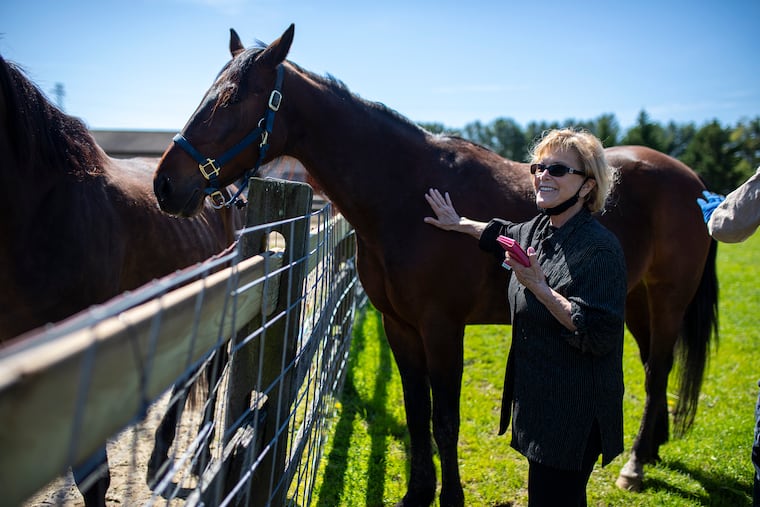Philadelphia-area horse rescues are struggling amid the coronavirus
“It’s virtually shut us down,” one Pennsylvania horse rescue director said of the coronavirus pandemic. Rescues and other nonprofit equestrian programs say donations are down while the need is way up.

Darlene Supnick wishes she could help all the people who’ve called her South Jersey horse rescue and asked for help since the coronavirus shutdown. Some have lost their jobs, she said, and can’t afford to care for their animals.
But Supnick, who has saved 300 horses from slaughter in recent years, can no longer provide immediate refuge. Her Forgotten Angels Equine Rescue is one of many horse rescues that have found themselves overwhelmed and struggling to stay afloat due to increasing need and declining donations.
“Now we have so many horses," she said. "We can’t take any more in.”
Between her three rescue properties and two foster homes, Supnick has 30 horses, eight of which have been saved since the pandemic began. Many more are on a wait list, she said, and a couple of horses are due to have babies this month.
The struggles of her rescue in Medford, Burlington County, are mirrored at other farms nationwide, including in Pennsylvania and New Jersey.
While residents under stay-at-home orders have rushed to foster and adopt cats, dogs, and other pets, horse adoptions are a bigger financial commitment. Aside from upfront adoption fees, which can be $1,000 or more, it can cost a couple of hundred dollars a month to feed and care for a single horse, and several hundred dollars more if an owner needs to board the animal.
» READ MORE: Coronavirus is a new challenge for the ‘recession-proof’ pet industry
For horse owners who have fallen into economic hardship, those costs can become too much. Some have turned to rescues, but rescues and other nonprofit programs are struggling, too. Donations have steeply declined, and they’ve been forced to halt in-person fund-raisers. They say emergency funding and support is lacking.
“It’s virtually shut us down,” said Kelly Smith, director of Omega Horse Rescue in York County.
Omega, which cares for 30 horses at two properties, has stopped adoptions because of the stay-at-home order, Smith said.
Donations are down by about 50%, she said, while veterinarian bills are piling up.
Smith said she has received payroll protection for the rescue’s three employees.
On the other side of York County near Harrisburg, Connie Greenawalt self-funds her Central Pennsylvania Horse Rescue, which currently cares for 28 horses on an 108-acre farm. On one hand, she said, she’s thankful not to rely on donations.
» READ MORE: Visits from Pegasus horses brighten locked-down days
But she is also concerned about her own finances, as a small-business owner who is ineligible for unemployment. She said it costs more than $100,000 a year to care for the horses on her farm. People who have recently lost jobs ask whether she can take back their horses, but she can’t afford to. So she gives them the names of other rescues.
Unlike many rescue directors, Greenawalt has actually seen an uptick in adoptions — six since the beginning of March (usually, she facilitates one or two a month).
In Egg Harbor City, Ellen Strack of South Jersey Horse Rescue said she’s caring for 12 horses, eight that are blind or disabled and unable to be adopted. In recent weeks, one healthy horse has been adopted, she said.
The rescue has had to stop its fund-raising trips to local Tractor Supply and Home Depot stores, and cancel group programs. Strack said they got a $1,000 grant from the Humane Society of the United States, but that covers only a small fraction of costs.
She wishes there were more programs to support horse rescues. Someone who needs to surrender a pet can usually find a no-kill shelter in their area, she said, but it is not so easy for struggling horse owners.
“Horse rescues are essential,” Strack said. “There’s a lot of horses in New Jersey and Pennsylvania, and we need these rescues.”
While the rescues have been hardest hit, they aren’t the only programs on unsteady footing.
On a family farm in West Chester, Nina and Charles Lyman rehabilitate retired thoroughbred racehorses through their nonprofit, TRRAC.
“We’re not doing terrible,” Nina Lyman said, “but things have certainly slowed down. We’ve been getting an influx of horses."
Adoptions have become less frequent, she said. In lieu of visits, they have been offering video appointments for potential adopters, she said, but many people want to see a horse in person before making the commitment.
With horse racing halted, TRRAC has not received as much funding for their horses’ medical and surgical care from partner race tracks, which include Parx in Bensalem, Lyman said. Donations are also down by 50%, she added.
At Chamounix Equestrian Center in Fairmount Park, the nonprofit “Work to Ride" hopes to keep providing opportunities for low-income, at-risk youth to learn about horsemanship and play equine sports.
“We’re not starving," said executive director Lezlie Hiner, who is continuing to feed 35 horses without any income from lessons and other programs. She is waiting for word from city officials about whether they can hold their summer camp, which draws 200 campers and accounts for about 25% of their income.
» FAQ: Your coronavirus questions, answered.
For the next few months, she said, grants should tide them over.
“We’ll be OK, for now,” she said. But she is worried about the pandemic dragging on.
“Ask me in July,” Hiner said. “I could have a totally different answer.”